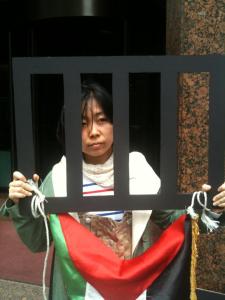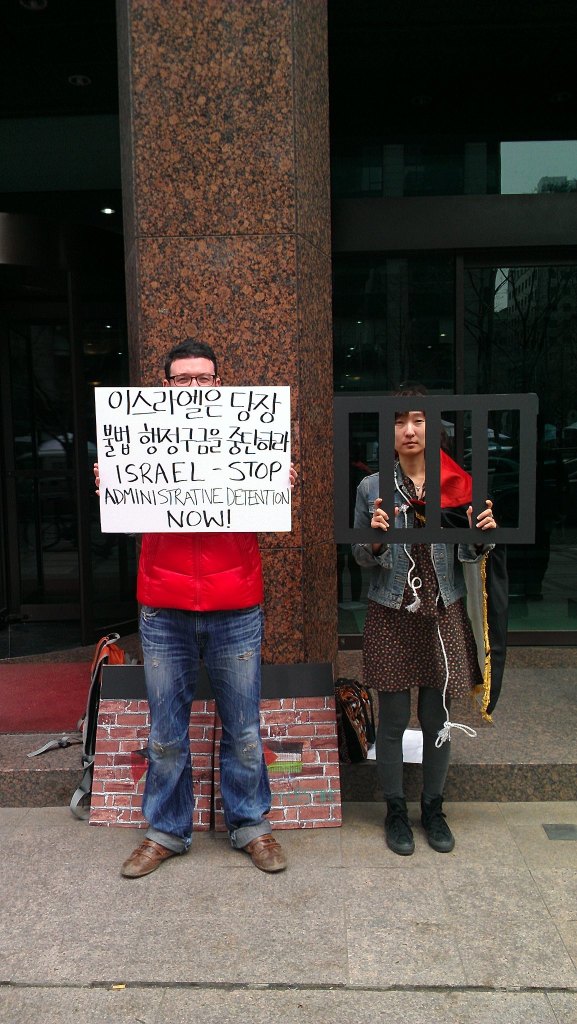As Koreans, our Palestine solidarity is rooted in a shared history of colonisation and occupation. We refuse to be complicit in Israel’s crimes, writes Sofia P.

From the Jordan River to the Yellow Sea, the struggles of the Palestinian people are deeply interconnected to the struggles of the Korean people.
Korea’s solidarity with Palestine is first and foremost rooted in the Korean people’s profound and intuitive ability to understand what it means to be colonised, to have your people divided, and to live on fragmented land.
Korea was militarily occupied by Japan until 1945, right as Palestine was facing the end of its British rule and the beginning of its Zionist occupation. The Nakba and the official division of Korea happened side by side in 1948, orchestrated by the same imperial interests.
To this day, both Palestine and Korea remain divided. Korea and Palestine are inextricably linked to each other and exist in parallel histories of oppression under occupation and colonialism.
On the most fundamental level, as Koreans, we understand the importance of establishing transnational solidarity networks for independence movements. Korean independence fighters famously carried out numerous global campaigns seeking international support for the Korean independence movement.
Koreans needed that transnational solidarity then, and it is now our turn to offer transnational solidarity to liberation movements worldwide, including that of the Palestinian people.
On a more existential level, we understand that the injustices and suffering faced by Palestinians are not theirs alone. The brazen and reckless actions of Israel threaten the common foundation of humanity and violate the sanctity of human life. More than 33,000 Palestinians have been killed by Israel in Gaza in the past six months.
As discerningly stated by Ryu Eun Sook from Human Rights Research Institute ‘Chang’, “humanity, dignity, and human rights are not something that we can claim and enjoy individually, but are based on the common foundation of humanity. When the dignity and human rights of Palestinians are trampled upon, the interconnected common ground that we stand on crumbles beneath our feet.”
Our collective humanity is at stake and what happens in Palestine affects us all.
What may come as a surprise, even to many Koreans, is that South Korea is in a unique position to pressure complicit companies and leverage economic boycotts against Israel. Israeli fruit can be easily found in supermarkets and many popular South Korean beverages contain extract from fruit that are “Produced in Israel”.
HD Hyundai, one of the largest multinational conglomerates in South Korea, sells heavy machinery to Israel, which are used to demolish Palestinian homes and build illegal settlements.
Not only do we have a hefty case of BDS (Boycott, Divestment, Sanction) on our hands, but the South Korean government is also actively involved in military cooperation and arms trade with Israel.
Between 2014 and 2022, South Korea exported approximately ₩57 billion ($43.9 million) worth of weapons to Israel. In 2021, South Korea became the first Asian country to sign a free trade agreement with Israel.
The strong economic and military ties between Israel and the Republic of Korea (ROK) are a clear indication of South Korea’s contribution to the normalisation of the apartheid regime of Israel, as well as their complicity in the maintenance of Zionist settler-colonialism.
Since its inception, BDS Korea has aimed to unearth the myriad connections linking Korea to the struggles of Palestine, and to illuminate the ways in which Koreans can contribute to the ending of Israel’s apartheid.
BDS Korea was first established as a result of the Iraq War, riding on a wave of anti-imperialist sentiment that resulted from the heavily opposed deployment of South Korean soldiers to Iraq.
At the time, many people were disillusioned with the spineless attitude of the ROK government, who decided to involve the Korean people in a war built on lies and American imperial interests.
Since then, the ROK government’s deferential approach to foreign policy as a client state of US imperialism has remained unchanged, and this has naturally affected South Korea’s proximity to Israel.
In opposition to this state of affairs, a minor but mighty faction of organisers committed to transnational solidarity has been steadfastly present in South Korean civil society.
While typically scattered throughout different groups and regions, these principled Koreans have gathered and shown up for various causes worldwide— the Rohingya genocide and the Russo-Ukrainian War being two recent examples.
The presence of interorganisational and cross-ideological solidarity has not left BDS Korea stranded alone in its commitment to Palestine. Despite the periodic expressions of solidarity, the gravity of the situation in Gaza post-October 7th necessitated a sustained, unified movement against the genocide in Gaza and Israel’s continued military occupation of Palestine.
Thus, an official urgent action coalition of 170 (and growing) civil society groups was formed.
Together with this coalition, BDS Korea is currently carrying out various actions against Israel— some of our past and current actions are biweekly rallies, educational forums, press conferences condemning US complicity in Israeli war crimes during Anthony Blinken’s visits to South Korea, and BDS campaigns against the multiple Korean companies that profit off the apartheid system in occupied Palestine.
Through the pressure generated from our actions, we hope to convey to the international community, and most of all to Israel, that Koreans stand firmly against the ethnic cleansing and genocide of Palestinians.
It is important to establish that our solidarity with Palestine does not simply come from a singular humanitarian desire to help the Palestinians. Much of our solidarity also comes from our recognition of the fact that their problems are directly connected to our own.
Korea has historically been both a victim and a perpetrator, with pending, unconfronted problems on both ends. As victims of Japanese imperialism, Korean society remains perturbed by colonial remnants and by our unsettled relationship with an insufficiently remorseful Japan.
As perpetrators, we have yet to properly address and apologise for the atrocities committed by ROK soldiers in Vietnam and the involvement of our troops later in Iraq.
At a time when reflection and reckoning with our own unresolved history is needed, many of the problems that hang over Palestine are the same problems that remain in Korean society.
If there’s anything substantive beyond transnational solidarity that Koreans can offer to Palestinians, it is our experience as a formerly colonised country still grappling with unresolved remnants of our colonial past.
True liberation is rarely, if ever, immediately achieved upon emancipation from colonial powers. The oppressive structures and repercussions resulting from prolonged occupation persistently linger and pollute “post-colonial” societies, and are prone to recreating and reinforcing cycles of injustice.
The “post-colonial” landscape of South Korea is characterised by severe wealth, gender, and political inequalities faced by minorities and the unapologetic complicity of the ROK government in imperialist ventures abroad.
Such dim developments are a rite of passage for many formerly colonised countries who have not sufficiently dealt with all remaining aspects of colonialism in the process of and after liberation.
It is with intense care for the Palestinian people that we cautiously express concerns about the possibility for similar progressions in Palestine, because this is the reality that Koreans live in today.
Our past is still our present and so the question of Palestine is all the more relevant to the current society of Korea. Our collective liberation depends on transnational solidarity, and at the forefront of this collective liberation is the freedom of the Palestinian people.
This is why we, as Koreans in Korea, do the work that we do, and we will not stop until Palestine is free.
Sofia P is an organiser with BDS Korea, a feminist organisation that stands in solidarity with the Palestinian liberation movement. BDS Korea aims to become a bridge between Korea and Palestine and has worked tirelessly to inform the South Korean society of Israel’s colonisation, apartheid, and military occupation of Palestine that have continued since 1948.
. contributed to The New Arab



